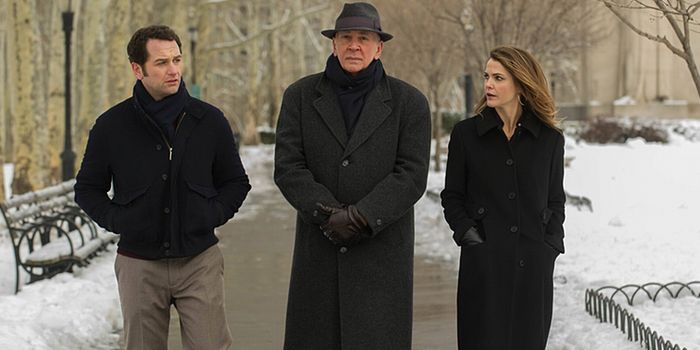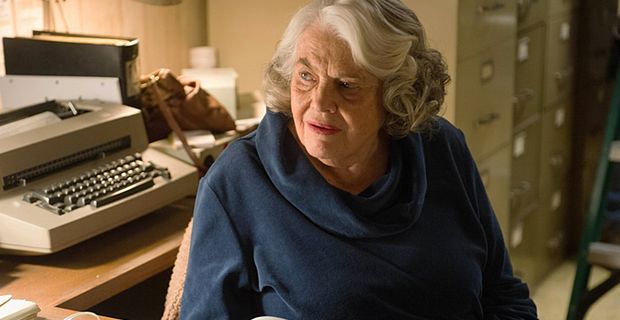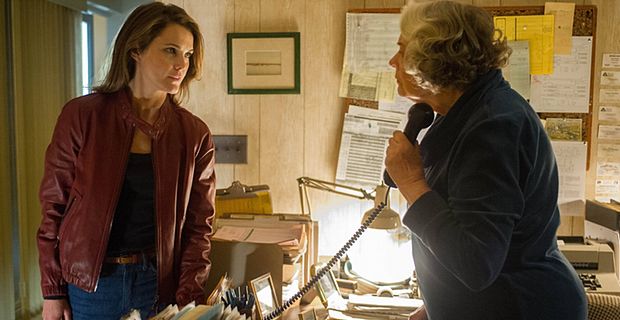[This is a review of The Americans season 3, episode 9. There will be SPOILERS.]
-
Early on in another fantastic episode of The Americans, an unhappy Hans tells Elizabeth that he would do anything for the Cause, and that he would do anything for her. What Hans is really telling Elizabeth is that the strength of his convictions with regard to ending the apartheid government in South Africa (and, probably more than either on of them would like to admit, his feelings for his handler) are more powerful than any sort of universally agreed upon moral code about not interfering with the lifespan of another human being. That means killing Todd, the scared-straight college student from South Africa who witnessed his own handler's disturbing, violent death during last week's 'Divestment.'
Hans goes through with killing Todd in a fashion that is in some ways even more gruesome and disturbing than Venter's execution by necklacing – which itself was an example of one man's (Rueben Ncgobo) devotion to his convictions, to something much larger than himself that dictated his violent actions upon another person. And by following through with the murder, Hans sets in motion another weighty discussion about violence and the rationalizations that are used to explain it away. All the while, The Americans turns up the volume on the graphic nature of violence in an extended scene where Todd is first shot in the face, and then strangled in an elevator. (It is worth noting that Hans later describes the incident as "messy.") The violence is a means of demonstrating how, in the eyes of the movement under which the action was carried out, brutality is often deemed not merely defensible but correct and necessary.
While the scene forces an empathetic response on behalf of the audience, it is simultaneously underlining the obligatory inhumanness of Todd's killer. There is evidence to suggest that Hans justifies Todd's death in two different ways. At some level, it is simply Hans doing what he must to appease Elizabeth – the fact that she looks an awful lot like Keri Russell makes this justification a simple one to understand. But at another level (that is much closer to the surface), Hans is likely telling himself his actions will make the world a better place, and that by removing Todd from the equation, he is that much closer to solving for a specific version of "x."
That goes a long way in rationalizing a wicked action; it is one that the characters on this show have used time and time again. What the episode is so adept at pointing out, then, is that the evil humans do unto one another for the causes they believe in,are often incomprehensible to the victims. But what The Americans is even more adept at demonstrating is how the rationalization of those violent actions becomes a veil, keeping the truth obscured from the perpetrators as well.
'Do Mail Robots Dream of Electric Sheep?' is a complex, heavy, and unsettling episode that confronts these questions, while wandering in lingering fog of Martha's discovery that Clark is not the man he says he is. The episode also shows the lengths to which Stan and Oleg are willing to go in order to see Nina set free. What's interesting about those two subplots is how they are driven by a different, but equally persuasive passion that encourages people like Martha, Stan, and Oleg to cast off loyalty to a construct, like a government or an ideology, for a single person. It is a belief that is summed up by Philip when he tells Gabriel his "job is to look out for his family because no one else will."
The focus on how characters rationalize their actions is a potent one from the get go. And then things get tricky, as the episode brings in the great Lois Smith to play Betty, an elderly woman with a bad heart, who has the misfortune of preferring to handle her bookkeeping at night. On this night, she happens to be present while Philip and Elizabeth are planting a bug in the titular FBI mail robot.
From the onset, it's clear Betty will not make it through her encounter with Elizabeth. But that does nothing to diminish the magnitude of the scene, as each detail Elizabeth reveals about herself becomes another nail in Betty's coffin. At the same time, each detail Betty dispenses about her relationship with the man she married twice draws a parallel to Elizabeth's relationship with Philip.
But the scene combines the complexities of marriage with the concerns of murder for ideological purposes. Eventually, it unfolds like a Cold War version of the Voight-Kampff empathy test featured in the Philip K. Dick story (and Blade Runner) from which the episode gets its title – swapping out question s of what separates humans from androids by underlining the qualities that separate people like Betty from people like Elizabeth. "That's what evil people tell themselves when they do evil things," Betty says when the discussion turns to Elizabeth's rationalization for her actions.
The lack of physical violence perpetrated on Betty in no way reduces the gravity of her demise. In some ways, it makes it worse, as the encounter becomes a long, torturous event in which an old woman recounts the unique circumstances of her marriage, while effectively committing suicide under the threat of physical harm. Betty is at the end of her life; it is a fact that, given the circumstances, she handles with an extraordinary amount of grace and dignity, a fact that is not lost on her killer. "Did he tell you I'm afraid of pain?" Betty asks Elizabeth at one point near the end, again referring to the late husband who has dominated the end-of-life interplay between the two. It is a question Elizabeth answers with an affirmation that is all the compassion the spy has to give in the moment.
It is a bleak moment to be sure, one of many that The Americans has featured this season and in the previous two. And while some may be turned off by the bleakness, it is important to note that the show's disconsolate tone is not a bug; it's a feature. There is no more frank or poignant conversation about the use of "necessary" violence on television right now, than the one presented here. There is no other program as measured in its approach to questioning the actions of its characters. It may be dark, but it's one of the many reasons keeping those invested coming back week after week.
The Americans continues next Wednesday with 'Stingers' @10pm on FX.
Photos: Jeffrey Neira/FX




